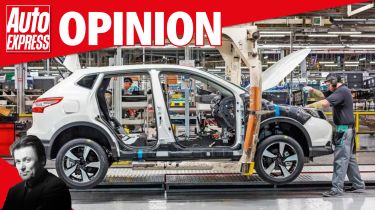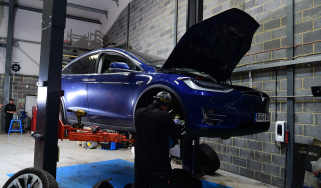“Almost 800,000 people are still working in Britain’s automotive industry”
Although Covid hit the UK car industry hard, Mike Rutherford thinks there are plenty of reasons to be optimistic

Two years after Covid first clobbered us, the car business in the UK remains badly bruised, but still alive and kicking. It’s down, but not out.
And believe it or not, in some departments, it’s healthier today than two years back. I’ve accessed the like-for-like (Spring 2020 vs Spring 2022) figures. Thankfully, they state that we still have 60-plus specialist manufacturers and that all seven of our major premium and sports car makers remain.
Mainstream manufacturer numbers dipped from six to five – thanks to Honda abandoning its Swindon factory. But the fact is that the struggling, isolated firm (now in need of a new partner or owner, surely) long ago lost its appetite for building cars in Blighty.
On a happier note, in the same pandemic-ravaged period, the number of automotive supply companies here grew from over 2,400 to 2,500-plus, while vehicle design centres on our soil almost doubled – from five to nine. Impressed? We bloody well ought to be.
True, two years ago Britain was celebrating new car sales of 2.3 million (and UK production of 1.2m) in 2019. And today we’re forced to reflect that only 1.6m were bought (just 860,000 built here) in 2021. Not good.
That said, we shouldn’t be shocked by these numbers. For much of the pandemic, consumers were unable to test drive and be enticed into new vehicles, due to laws that insisted dealerships couldn’t open.
Component and vehicle supply difficulties plus transport issues were – and remain – extra unwelcome problems. And the icing on the cake is that over the last couple of years, many manufacturers have significantly upped their retail prices to what some consumers now regard as prohibitively expensive levels.
Surprise, surprise, all the above has encouraged untold drivers to stick with the cars they’ve already got or opt for newer, but not brand-new, versions – especially as so many of them work from home these days. They argue that their new, low or no-commuting, reduced-mileage lifestyles mean they don’t need (and maybe can’t afford) expensive new cars they’d hardly ever use. And it’s an argument the motor manufacturing industry must address if it’s serious about bringing new-car sales back to pre-Covid levels.
What the Society of Motor Manufacturers and Traders describes as “people employed across UK automotive” totalled 864,000 two years ago. Today it’s 797,000. And although those job losses are often tragedies for unwanted workers and their families, there are some positives. Almost 800,00 people (156,000 of them in manufacturing) still earning a decent living in Britain’s automotive industry makes it one of the UK’s biggest employers. And the SMMT’s forecasts for “job creation” in the car business have doubled since 2020.
We have the talented workers, famous brands, state-of-the-art factories and world-class design studios to justify a million jobs in UK Automotive in the coming years. Scotland and Northern Ireland owe it to themselves to join the car-building club. Let the growth, and the massive recruitment drive, begin – starting with formal invitation/incentive letters from UK Government to Tesla and Hyundai asking each to open a factory in Britain.
Click here for our list of the best-selling cars in the UK...
Find a car with the experts




